Edie Melson's Blog, page 193
July 25, 2020
Where do We Turn When the World is Upside Down
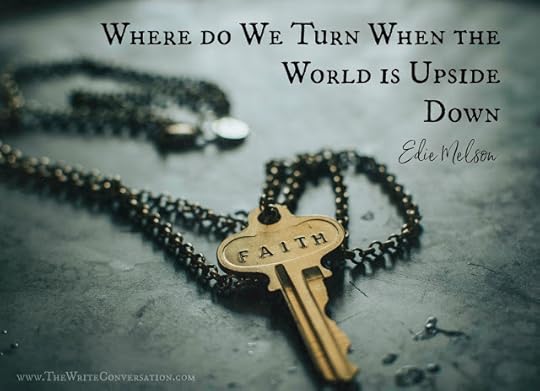
by Edie Melson @EdieMelson
My eyes shed streams of tears, because people do not keep your law. Psalm 119:136
Everywhere I turn I see believers crying out, looking for answers. Many are looking for our governments to step in and save us. And while I do have personal opinions about events of these days—what I’m truly mourning is the fact that we’re no longer looking to God for salvation, but to man.
Each of us carries a foundational idea of right and wrong. It’s something that God has instilled within us.
You see, our conscience comes from God. It was created within us when we were formed in the womb. If we were just products of Darwin’s theory, then our conscience would be weighted with a foundation of kill or be killed—survival of the fittest. Instead, we have a different foundation.
Don’t believe me? Take a look at our laws. Take a look at our day-to-day interactions. We don’t reward bullies and those who look out only for themselves. Our belief system reflects something more than that. It reflects God.
We can stifle our conscience by ignoring it and trying to re-educate it. But it’s still there, and when we once again turn our ear to that pure voice, it will spring back to life.
In these days, we each need to turn back—to look to God to dictate what is right and what is wrong. First as individuals, then as a country. When we make God our priority, then the other things will fall into place. We’ll interact with one another in love.
No, I’m not suggesting some type of hippy nirvana filled with a false sense of anything goes. Or a watered down version of who God is and how He demonstrates His love for us.
His love is the real kind.
The hard kind.
The kind that calls forLoving our enemies.Forgiving those who wrong us.Holding one another accountable.Turning the other cheek.Standing up for what is right, whether it’s the law or not.When we look to God for the answers, we’ll find unity.
Not uniformity, never that. God created each of us unique and special. But He gave us traits in common—with Him—and with each other.
So today, I’m praying for our country. And I’m not praying small. I’m not focusing on individual sins, although I'm beginning there. I know I'm not perfect. So I’m first praying about my own short comings and asking for forgiveness and a renewed sense of right and wrong. I want God to clean out the junk and put me back on a track to be more like Him. Then I’m asking God to reclaim this country as His—with His definition of right and wrong.
Can one person make a difference?
Maybe not at first.
But for a difference to be made, we must all begin alone, in a one-on-one conversation with God. Then, when all those individuals come together and return to God, absolutely.
Will you join me?
If My people who are called by My name will humble themselves, and pray and seek My face, and turn from their wicked ways, then I will hear from heaven, and will forgive their sin and heal their land. II Chronicles 7:14
TWEETABLEWhere do We Turn When the World is Upside Down? - @EdieMelson (Click to Tweet)
 Edie Melson is a woman of faith with ink-stained fingers observing life through the lens of her camera. No matter whether she’s talking to writers, entrepreneurs, or readers, her first advice is always “Find your voice, live your story.” As an author, blogger, and speaker she’s encouraged and challenged audiences across the country and around the world. Her numerous books reflect her passion to help others develop the strength of their God-given gifts and apply them to their lives.Connect with her on her website, through Facebook, Twitter and on Instagram.
Edie Melson is a woman of faith with ink-stained fingers observing life through the lens of her camera. No matter whether she’s talking to writers, entrepreneurs, or readers, her first advice is always “Find your voice, live your story.” As an author, blogger, and speaker she’s encouraged and challenged audiences across the country and around the world. Her numerous books reflect her passion to help others develop the strength of their God-given gifts and apply them to their lives.Connect with her on her website, through Facebook, Twitter and on Instagram.
Published on July 25, 2020 22:00
July 24, 2020
14 Tips for Selling More Books When You Speak
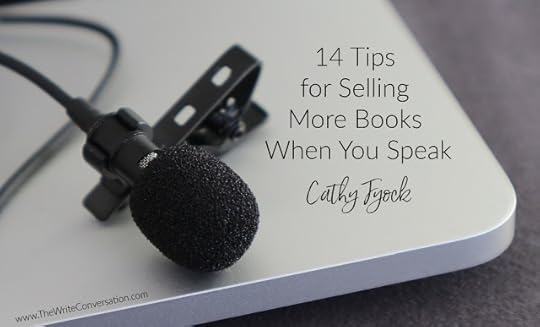
by Cathy Fyock @CathyFyock
You’re an author and you’re a speaker. How do you sell more books when you are asked to speak?When you book the engagement, ask the meeting planner if it doesn’t make sense to extend the value of the program by pre-ordering a book for every attendee. It often does make sense, and allows you not only generate more revenue, but also increase the stickiness of your message (not to mention, give everyone in the audience the best calling card ever!).In the conference program, include the name of your book as part of your title. Be sure your introducer uses the name of your book by giving her your introduction in advance, and taking an extra copy of your intro to the conference. Give a book to your introducer, and encourage her to hold up the book as she mentions your book signing event.Be sure you mention the name of your book throughout your presentation. State the title slowly and distinctly (you know it so well, but your audience doesn’t). Offer a handout, postcard, or bookmark as a takeaway that includes your book’s name and how to reach you (via email, telephone, Facebook, Twitter, LinkedIn). Your readers want to be able to connect with you so don’t make them search.Read from your book, and HOLD A COPY OF YOUR BOOK! Even though you may have it electronically and can read it from your phone or other electronic device, it is powerful to hold the book and let the audience see the cover of your book.Have a method to collect the names of those attending your session so that you can sell books after the presentation. You can do this by having a sign-in sheet (“sign-up for my free newsletter or blog”), collecting cards and giving a door prize (like your book!), or by offering a free goodie (like a sample chapter or other tangential product). You can do this by asking attendees to send an email to you or to visit your website to download the freebie (in marketing we call this freebie an “irresistible free offer” or IFO).During your presentation, mention your website and your IFOs (give them a reason to visit your site!). You want readers to engage with you so that you can sell books after the event!Use a PowerPoint or poster that includes the cover of the book and its title and your contact information. If you want to encourage Tweeting during your presentation, share your hashtag by announcing it at the beginning of your presentation or on your PowerPoint.Offer your books for sale after you speak, and be sure to announce when and where your book signing will be. Be sure that the conference planners allow plenty of time following your session for individuals to purchase your book. Ideally, position the book store close to your conference presentation site, or set up a sales counter outside your speaking venue. Jockey for position (think food, coffee, restrooms). Remember, “Location, location, location” will also help you sell more books when speaking!When you sign your books, be sure to get a card or contact information from your reader. Offer to personalize your book for the reader, and offer a bookmark or label for the book that says “autographed by the author.” Take pictures of you holding your book with those who have purchased your book. Post these on social media and share the post with your new readers.Make it easy for attendees to purchase your book. In pricing your book, make it quick and easy. Many attendees come up to me with a $20 bill, so charge $20 and save yourself from making change and holding up the line. Also, bundle products to offer value for attendees.Accept credit cards by using a card reader. Practice prior to the event, or better yet, find an assistant to help you with sales so that you can schmooze with attendees and sell more books (and book more engagements!).
What are your best ideas for selling your books?
TWEETABLE14 Tips for Selling More Books When You Speak - @CathyFyock on @EdieMelson (Click to Tweet)
 Cathy Fyock is The Business Book Strategist, and works with professionals and thought leaders who want to write a book as a business development strategy. Since starting her business as a book coach in 2014, she has helped more than 160 professionals become published authors. Her most recent book is The Speaker Author: Sell More Books and Book More Speeches. She can be reached at cathy@cathyfyock.com or 502-445-6539.
Cathy Fyock is The Business Book Strategist, and works with professionals and thought leaders who want to write a book as a business development strategy. Since starting her business as a book coach in 2014, she has helped more than 160 professionals become published authors. Her most recent book is The Speaker Author: Sell More Books and Book More Speeches. She can be reached at cathy@cathyfyock.com or 502-445-6539.
Published on July 24, 2020 22:00
July 23, 2020
Are You Wearing Your Writing PPE?
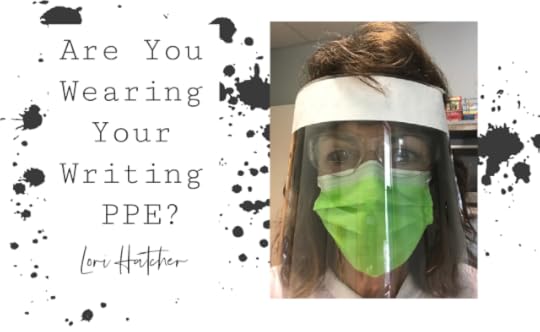
by Lori Hatcher @LoriHatcher2
Before COVID-19, most people had never heard the term PPE (Personal Protective Equipment). Now PPE has become part of our everyday vernacular. I’m a dental hygienist who has worn PPE for 35 years, but COVID-19 has taken the concept of personal protection to a whole new level.
Medical and dental professionals aren’t the only ones who need to wear PPE. Writers should, too. Let me explain.A Writer's PPE
The first piece of PPE I put on is my lab coat. Made of water-resistant material, my coat is the first line of defense against spray, splatter, and splashes. Its special fabric protects my skin from contaminants and causes liquid to bead up and roll off instead of soaking in.
Writers need a similar coat to protect their skin. Although our skin toughens up the longer we navigate the publishing world, we never become fully immune to caustic comments, painful rejections, and negative reviews from readers, editors, and colleagues.
The best writing lab coats are reinforced with God’s Word. When we clothe ourselves in truth , dangerous and damaging words are more likely to roll off us. Seeing the world through the filter of Scripture toughens our skin and makes us less vulnerable to attack.
After I button up my lab coat, I slip on a pair of goggles. My goggles serve two purposes—magnification and protection. Special lenses bring tiny objects like premolars into sharper focus, enabling me to see more clearly. The goggles’ wrap-around design prevents debris from flying into my eyes.
A writer’s goggles can do the same.
Wise mentors, critique groups, classes, and conferences provide the magnification we need to see our writing clearly. They enable us to spot what needs to be fixed and celebrate what works well. They sharpen our focus and hone our message.
The Psalmist (who was a writer, by the way) used a pair of spiritual goggles to protect his eyes from harm. “Turn my eyes from looking at worthless things,” he prayed (Psalm 119:37 ESV).
Worthless things for a writer include gazing at others’ success, staring at our social media numbers, and becoming distracted by everything that whizzes by in the writing world. Proverbs 4:25 is a prayer prescription for the easily distracted: “Let your eyes look directly ahead and let your gaze be fixed straight in front of you.”
After I slip on my goggles, I cover my mouth and nose with a mask. The mask’s three layers of filtration protect my patient from anything harmful lurking in my respiratory system.
Writers benefit from wearing a three-layer mask, too. Because we never, ever want to harm a reader with something we’ve written, we can pray Psalm 141:3, the first layer of filtration: “Set a guard over my mouth, LORD; keep watch over the door of my lips [and my pen].” If you wouldn’t say it, you certainly shouldn’t write it.
Ephesians 4:15 provides the second layer: “Speaking the truth in love.”
Ephesians 4:29 supplies the third: “Do not let any unwholesome talk come out of your mouths [or your computers], but only what is helpful for building others up according to their needs, that it may benefit those who listen.”
The final component of my dental hygiene PPE is my shield. It protects me from toxic elements in the air around me. Some of the procedures I perform launch germs, viruses, aerosols, and debris into the air. My shield acts as a physical barrier between me and my patient.
A writer’s shield is the shield of faith (Ephesians 6:16). With faith, we can “quench all the fiery darts of the wicked one.” When we seek God’s direction and inspiration before we write a blog post, article, short story, or chapter, we invite the Holy Spirit to lead and guide our words.
God knows who will read our work, what their needs are, and what He plans to accomplish in their lives through our writing. If we pick up our pens without consulting God, we act presumptuously.
“Without faith,” Hebrews 11:6 reminds us, “it is impossible to please God.” To please God with our writing, we must approach every project fully surrendered to His will and purposes.
I’d never dream of caring for a patient without my PPE on—for their sake and for mine. Christian writers should never approach our writing without our PPE. With our spiritual lab coat, goggles, mask, and shield, we can “be strong in the Lord and in his mighty power. Put on the full armor [PPE] of God, so that you can take your stand against the devil’s schemes” (Ephesians 6:10-11).
May God lead, guide, use, and protect you as you write for Him.
TWEETABLEAre You Wearing Your Writing PPE? - insight from @LoriHatcher2 on @EdieMelson (Click to Tweet)
 Lori Hatcher loves to teach, train, and encourage writers by sharing what others have generously shared with her. She’s the author of several devotional books including
Refresh Your Faith – Uncommon Devotions from Every Book of the Bible
and
Hungry for God … Starving for Time, Five-Minute Devotions for Busy Women
, the 2016 Christian Small Publisher Book of the Year. The editor of
Reach Out, Columbia
magazine, she’s also a blogger, writing instructor, and inspirational speaker. You’ll find her pondering the marvelous and the mundane on her blog, Hungry for God. . . Starving for Time . Connect with her on Facebook, Twitter (@LoriHatcher2), or Pinterest (Hungry for God).
Lori Hatcher loves to teach, train, and encourage writers by sharing what others have generously shared with her. She’s the author of several devotional books including
Refresh Your Faith – Uncommon Devotions from Every Book of the Bible
and
Hungry for God … Starving for Time, Five-Minute Devotions for Busy Women
, the 2016 Christian Small Publisher Book of the Year. The editor of
Reach Out, Columbia
magazine, she’s also a blogger, writing instructor, and inspirational speaker. You’ll find her pondering the marvelous and the mundane on her blog, Hungry for God. . . Starving for Time . Connect with her on Facebook, Twitter (@LoriHatcher2), or Pinterest (Hungry for God).
Published on July 23, 2020 22:00
July 22, 2020
When A True Story Becomes A Book
Edie here. I'm super excited to announce a new regular contributor here on The Write Conversation! I'm sure you've enjoyed the guest posts from Crystal the past few months and now we're going to hear from her every month. We're blessed to have her, so give her a warm welcome to our TWC crew!
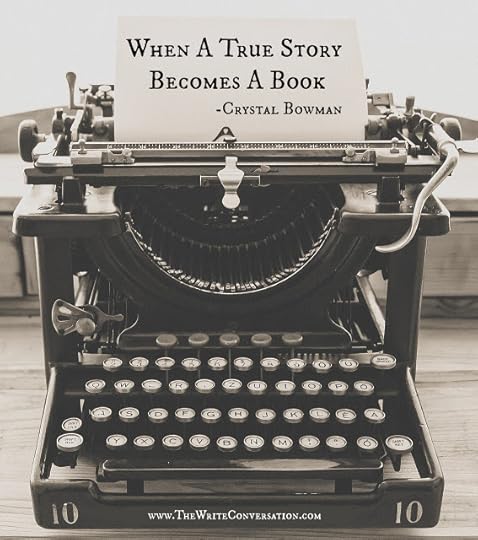
When a True Story Becomes a Bookby Crystal Bowman
When people have a life experience they want to turn into a book, it can be challenging. Even though the experience may be book worthy, it still needs to meet the literary requirements of a professionally written story. So how true does a story need to be to be a true story?My agent e-introduced me to a professor from Denver Seminary whose brilliant wife was diagnosed with dementia in her early 50s. A writer of numerous academic books, he also wrote a memoir about his journey caring for his wife through her life-altering disease. The type of dementia she had caused her to lose her ability to communicate. The intelligent, articulate wife he loved could no longer find words. The relationships she had with people diminished completely, but her relationship with Sunny, their terrier, stayed the same. A friend suggested that he write a picture book to help children understand how this disease can affect someone they love. That’s when we met.
During a lengthy phone conversation I explained that a picture book on this topic is needed in today’s market, but the story about his wife could not be told exactly how things happened. To being with, they had no children or grandchildren. A picture book needs at least one child character, so we would need to add that. Many of the medical details would not make age appropriate content, so we would need to drop some of that. We discussed other details that could be included or deleted, but one thing was certain—Sunny would definitely be in the book.
I created three characters—a boy, his grandmother, and his mother, and included Sunny as the canine character. I wrote the story in first person, from the grandson’s point of view, allowing the reader to experience the story though the eyes of a child. The boy is happy when Grandma and Sunny come to live with them. They enjoy many fun days until Grandma’s forgetfulness begins to change their lives. When the mother can no longer care for Grandma, they need to move Grandma to a home where other people can take care of her.
A children’s story does not need a happily-ever-after ending, but it needs to end with hope. I created an ending that will make the reader smile but may also trigger a gentle tear. Is the story a true story? No. The genre is fiction, but it is inspired by a true story and dedicated to the professor’s wife, whom he adored.
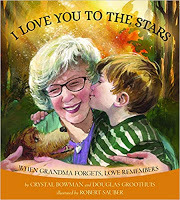 Whether you write a book for adults or children, a true story doesn’t always translate into a good book. Sometimes it does, but sometimes it doesn’t. When writing a book based on a true story, writers need to discern which facts are needed and which ones are not. We needed Sunny in our story, so he made the cut. And to make him true-to-life, we sent the illustrator a picture of Sunny. He nailed it!
Whether you write a book for adults or children, a true story doesn’t always translate into a good book. Sometimes it does, but sometimes it doesn’t. When writing a book based on a true story, writers need to discern which facts are needed and which ones are not. We needed Sunny in our story, so he made the cut. And to make him true-to-life, we sent the illustrator a picture of Sunny. He nailed it!
I Love You to the Stars—When Grandma Forgets, Love Remembers will release this fall, published by Kregel Publishing. (It's available for preorder NOW!)
TWEETABLEWhen a True Story Becomes a Book - Crystal Bowman on @EdieMelson (Click to Tweet)
 Crystal Bowman is an award-winning, bestselling author of more than 100 books for children and four nonfiction books for women. She also writes lyrics for children’s piano music and is a monthly contributor to Clubhouse Jr. Magazine. She loves going to schools to teach kids about poetry. She also speaks at MOPS (Mothers of Preschoolers) groups and teaches workshops at writers’ conferences. When she is not writing or speaking, she enjoys going for walks, working out at the gym, and eating ice cream. She and her husband live in Michigan and have seven huggable grandkids. www.crystalbowman.comwww.facebook.com/crystal.bowmanwww.facebook.com/crystaljbowmanwww.Instagram.com/crystalbowmanauthor
Crystal Bowman is an award-winning, bestselling author of more than 100 books for children and four nonfiction books for women. She also writes lyrics for children’s piano music and is a monthly contributor to Clubhouse Jr. Magazine. She loves going to schools to teach kids about poetry. She also speaks at MOPS (Mothers of Preschoolers) groups and teaches workshops at writers’ conferences. When she is not writing or speaking, she enjoys going for walks, working out at the gym, and eating ice cream. She and her husband live in Michigan and have seven huggable grandkids. www.crystalbowman.comwww.facebook.com/crystal.bowmanwww.facebook.com/crystaljbowmanwww.Instagram.com/crystalbowmanauthor

When a True Story Becomes a Bookby Crystal Bowman
When people have a life experience they want to turn into a book, it can be challenging. Even though the experience may be book worthy, it still needs to meet the literary requirements of a professionally written story. So how true does a story need to be to be a true story?My agent e-introduced me to a professor from Denver Seminary whose brilliant wife was diagnosed with dementia in her early 50s. A writer of numerous academic books, he also wrote a memoir about his journey caring for his wife through her life-altering disease. The type of dementia she had caused her to lose her ability to communicate. The intelligent, articulate wife he loved could no longer find words. The relationships she had with people diminished completely, but her relationship with Sunny, their terrier, stayed the same. A friend suggested that he write a picture book to help children understand how this disease can affect someone they love. That’s when we met.
During a lengthy phone conversation I explained that a picture book on this topic is needed in today’s market, but the story about his wife could not be told exactly how things happened. To being with, they had no children or grandchildren. A picture book needs at least one child character, so we would need to add that. Many of the medical details would not make age appropriate content, so we would need to drop some of that. We discussed other details that could be included or deleted, but one thing was certain—Sunny would definitely be in the book.
I created three characters—a boy, his grandmother, and his mother, and included Sunny as the canine character. I wrote the story in first person, from the grandson’s point of view, allowing the reader to experience the story though the eyes of a child. The boy is happy when Grandma and Sunny come to live with them. They enjoy many fun days until Grandma’s forgetfulness begins to change their lives. When the mother can no longer care for Grandma, they need to move Grandma to a home where other people can take care of her.
A children’s story does not need a happily-ever-after ending, but it needs to end with hope. I created an ending that will make the reader smile but may also trigger a gentle tear. Is the story a true story? No. The genre is fiction, but it is inspired by a true story and dedicated to the professor’s wife, whom he adored.
 Whether you write a book for adults or children, a true story doesn’t always translate into a good book. Sometimes it does, but sometimes it doesn’t. When writing a book based on a true story, writers need to discern which facts are needed and which ones are not. We needed Sunny in our story, so he made the cut. And to make him true-to-life, we sent the illustrator a picture of Sunny. He nailed it!
Whether you write a book for adults or children, a true story doesn’t always translate into a good book. Sometimes it does, but sometimes it doesn’t. When writing a book based on a true story, writers need to discern which facts are needed and which ones are not. We needed Sunny in our story, so he made the cut. And to make him true-to-life, we sent the illustrator a picture of Sunny. He nailed it! I Love You to the Stars—When Grandma Forgets, Love Remembers will release this fall, published by Kregel Publishing. (It's available for preorder NOW!)
TWEETABLEWhen a True Story Becomes a Book - Crystal Bowman on @EdieMelson (Click to Tweet)
 Crystal Bowman is an award-winning, bestselling author of more than 100 books for children and four nonfiction books for women. She also writes lyrics for children’s piano music and is a monthly contributor to Clubhouse Jr. Magazine. She loves going to schools to teach kids about poetry. She also speaks at MOPS (Mothers of Preschoolers) groups and teaches workshops at writers’ conferences. When she is not writing or speaking, she enjoys going for walks, working out at the gym, and eating ice cream. She and her husband live in Michigan and have seven huggable grandkids. www.crystalbowman.comwww.facebook.com/crystal.bowmanwww.facebook.com/crystaljbowmanwww.Instagram.com/crystalbowmanauthor
Crystal Bowman is an award-winning, bestselling author of more than 100 books for children and four nonfiction books for women. She also writes lyrics for children’s piano music and is a monthly contributor to Clubhouse Jr. Magazine. She loves going to schools to teach kids about poetry. She also speaks at MOPS (Mothers of Preschoolers) groups and teaches workshops at writers’ conferences. When she is not writing or speaking, she enjoys going for walks, working out at the gym, and eating ice cream. She and her husband live in Michigan and have seven huggable grandkids. www.crystalbowman.comwww.facebook.com/crystal.bowmanwww.facebook.com/crystaljbowmanwww.Instagram.com/crystalbowmanauthor
Published on July 22, 2020 22:00
July 21, 2020
Five Ways Writers Can Waste Money

by DiAnn Mills @DiAnnMills
Most writers would not knowingly squander money on anything related to their personal or professional writing life. We write because we have something to say, and a goal is for readers to find value—and for us to earn a little money. We need to make an ongoing investment in our careers for items that improve our craft and our platforms. That’s true for every writer who wants to better themselves in the publishing world. But some expenses are a waste. Usually, these money-stealers are disguised by the seller as critical and necessary. Some sources promise publication with huge monetary returns and perks. I don’t want you to get stuck in one of those pitfalls.
Here are five ways writers can Waste money.
1. Paying an agent to read their work.A writer ensures a book project is edited and marketable before approaching an agent. If the agent believes in the project and chooses to represent it, the agent and writer become a team. The agent believes the book is excellent and can sell it. Industry standards typically have the agent receiving a 15% commission of royalties when a publisher issues any contracted amounts due.
An agent who requires an upfront payment to read the manuscript is misrepresenting the definition of a literary agent. If an edit is needed, the agent can make a recommendation. There’s no guarantee the agent can sell the project but engaging a reputable agent who is respected in the industry understands the publishing business and does their best to represent the project.
2. Paying a publicist who has no track record.A publicist is an expert who specializes in promoting a writer’s work or brand to raise visibility and public awareness. They always read the book and search for selling points. A good publicist is knowledgeable of the industry, knows the appropriate contacts, and creates a plan for the writer that is unique and includes how the publicist will regularly communicate with the writer. Although a publicist can’t guarantee sales or media placement, taking a chance on a publicist who has no comparable industry history can be a gamble.
3. Paying a reader to endorse a book.The practice of a writer paying for an endorsement is not wise. Instead, consider these guidelines: a writer approaches a potential endorser and asks if the person would consider reading the book in the galley stage for possible endorsement. Word the request graciously and respectfully.
4. Paying for social media followers.True followers are interested in a relationship with the writer—their opinions, personality, publications, special interests, etc. Purchased followers can be fake, never share quality information, and may choose to disconnect with the writer at any time.
Professional writers grow their followers through organic means. A natural process in which the writer and the follower are linked by choice.
5. Paying for a service that promises bestselling status.Many of us receive emails daily from those companies or persons who promise bestselling status and/or six-figure income by investing in a class or service. Really?
Writers and their books typically become bestsellers by creating an outstanding project that entertains, inspires, encourages, or instructs a reader.
All writers can fall prey to these five mistakes. If we’re diligent in our work habits, we can discern what is a wise investment and what is a money-waster. Have you ever regretted purchasing a service or event that headlined as a means to make you successful?
TWEETABLEFive Ways Writers Can Waste Money - @DiAnnMills on @EdieMelson (Click to Tweet)
 DiAnn Mills is a bestselling author who believes her readers should expect an adventure. She creates action-packed, suspense-filled novels to thrill readers. Her titles have appeared on the CBA and ECPA bestseller lists; won two Christy Awards; and been finalists for the RITA, Daphne Du Maurier, Inspirational Readers’ Choice, and Carol award contests.
DiAnn Mills is a bestselling author who believes her readers should expect an adventure. She creates action-packed, suspense-filled novels to thrill readers. Her titles have appeared on the CBA and ECPA bestseller lists; won two Christy Awards; and been finalists for the RITA, Daphne Du Maurier, Inspirational Readers’ Choice, and Carol award contests. She is the director of the Blue Ridge Mountain Christian Writers Conference, Mountainside Marketing Retreat, and Mountainside Novelist Retreat with social media specialist Edie Melson. Connect here: DiAnnMills.com
Published on July 21, 2020 22:00
July 20, 2020
When Writers Need to Pivot…
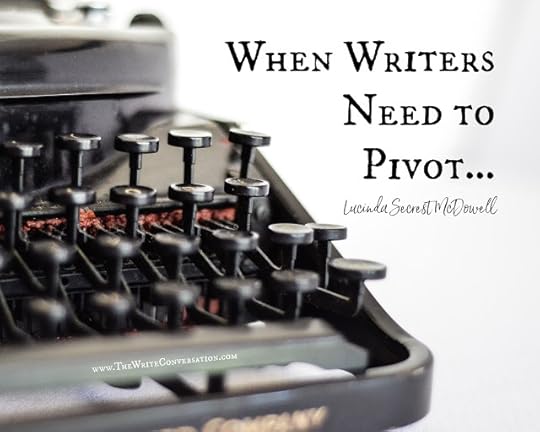
by Lucinda Secrest McDowell @LucindaSMcDowel
This week I attended an online panel of publishing personnel discussing how our industry is having to pivot during this time of upheaval with many of the usual communication platforms out of commission due to the world pandemic. In other words, when our product or the normal delivery of such is no longer meeting the need, we must change—pivot—and try new things. I find this both exciting and scary.
But I’ve been somewhat of a pioneer my whole life, so I’m not afraid to try (and possibly fail) in new ventures.
Here are just a few ways writers can still share our words, in addition to writing traditional books:
Blog: Regular postings of short devotions or book reviews or reflections of life are still read and a great place to work on your writing. Most blogs are 500-700 words and sent to an email list of subscribers. But it’s a great idea a few days later to post a teaser and include the link to that blog on your social media.
Facebook Live: While it seems that everyone is popping up on your feed with something to say, why not join in? Perhaps the shorter message, the better. Give an encouraging devotion, read a favorite text, or share some good news. Several authors invited me to join them in reading aloud the Psalms for the first two weeks of May – that’s when I learned how to do FB Live. During the quarantine several authors did book launches through Facebook Live to great response.
Webinar: Many organizations rely on experts to present webinars to their followers. Even if you aren’t paid, this kind of opportunity provides great exposure and gives you a chance to share your knowledge. I’m excited to do a webinar for First Place for Health on “How to Share Your Story” next month.
Guest Post: Contact other writer friends and exchange stories for each other’s blogs one week. It’s a great way to meet new people (and potential readers) and also helps you lift up fellow writers.
Online Event Speaking: Like many of you, most of my Spring/Summer/Fall speaking events were either cancelled or postponed. But some were moved online and therefore I was still able to speak, facilitate discussion groups, do one-on-one mentoring, and meet new contacts. Of course, I had to learn a lot of new technological skills (pre-recording sessions, zoom rooms, google meet, and more) but it was well worth it and I am grateful for the opportunities to serve.
Compilation Book: Often a collegial group will come together and pool articles or stories in a compilation book. This can be a fairly easy way to get in print and have product at your book table (when those in-person events return.)
Short Subject Book: I just received in the mail a small, 140-page devotional from Moody Publishers that was developed quickly to address current needs – “Psalms for the Anxious Heart.” If you have content that addresses something current, a short book might be the way to go – just be sure you have some ideas for getting it into the hands of readers.
Zoom Teaching: With a new book releasing late February, I was thrilled to schedule a weekly Bible Study based on “Soul Strong” at a local coffee shop. After 50 women registered, the world shut down, so we took a risk and moved the whole thing to Zoom. Everyone was on a high learning curve but those eight weeks got us through mid-March to mid-May focusing on God’s strength so it was well worth it.
What are you doing that’s new and innovative in these changing times?
TWEETABLEWhen Writers Need to Pivot - tips and encouragement from @LucindaSMcDowel on @EdieMelson (Click to Tweet)
 Lucinda Secrest McDowell, M.T.S., is a storyteller and seasoned mentor who engages both heart and mind while
“Helping you Choose a Life of Serenity & Strength.”
A graduate of Gordon-Conwell Theological Seminary and Furman University, McDowell is the author of 15 books and contributing author to 30+ books. Her award-winning books include
LIFE-GIVING CHOICES
,
SOUL STRONG
(2020),
DWELLING PLACES
(2017 Christian Retailing BEST Award for Devotional),
ORDINARY GRACES
(2018 Selah Finalist),
LIVE THESE WORDS
, and
Refresh!
Lucinda, a member of the REDBUD WRITERS GUILD, received Mt. Hermon “Writer of the Year” award and guest blogs for The Write Conversation, Blue Ridge Mountains Christian Writers Conference Blog and (in)courage. Whether co-directing
“RENEW ~ RETREAT FOR NEW ENGLAND WRITING,”
pouring into young mamas, or leading a restorative day of prayer, she is energized by investing in people of all ages. Lucinda’s favorites include tea parties, good books, laughing friends, ancient prayers, country music, cozy quilts, musical theatre, and especially her family scattered around the world doing amazing things. Known for her ability to convey deep truth in practical and winsome ways, she writes from “Sunnyside” cottage in New England and blogs weekly at
https://lucindasecrestmcdowell.com/
Follow Lucinda on Twitter: @LUCINDASMCDOWEL
Lucinda Secrest McDowell, M.T.S., is a storyteller and seasoned mentor who engages both heart and mind while
“Helping you Choose a Life of Serenity & Strength.”
A graduate of Gordon-Conwell Theological Seminary and Furman University, McDowell is the author of 15 books and contributing author to 30+ books. Her award-winning books include
LIFE-GIVING CHOICES
,
SOUL STRONG
(2020),
DWELLING PLACES
(2017 Christian Retailing BEST Award for Devotional),
ORDINARY GRACES
(2018 Selah Finalist),
LIVE THESE WORDS
, and
Refresh!
Lucinda, a member of the REDBUD WRITERS GUILD, received Mt. Hermon “Writer of the Year” award and guest blogs for The Write Conversation, Blue Ridge Mountains Christian Writers Conference Blog and (in)courage. Whether co-directing
“RENEW ~ RETREAT FOR NEW ENGLAND WRITING,”
pouring into young mamas, or leading a restorative day of prayer, she is energized by investing in people of all ages. Lucinda’s favorites include tea parties, good books, laughing friends, ancient prayers, country music, cozy quilts, musical theatre, and especially her family scattered around the world doing amazing things. Known for her ability to convey deep truth in practical and winsome ways, she writes from “Sunnyside” cottage in New England and blogs weekly at
https://lucindasecrestmcdowell.com/
Follow Lucinda on Twitter: @LUCINDASMCDOWEL
Published on July 20, 2020 22:00
July 19, 2020
Tips to Add Marketing Pizzazz to Your Publishing Plan, Part 1

by Karen Whiting @KarenHWhiting
No one adds sparkle, pizzazz, or builds experiences that beckon us to return like Disney. Be Our Guest: Perfecting the Art of Customer Service written by the Disney Institute shares secrets of success for their marketing to customers. Let’s apply those ideas to book marketing to add WOW factors of service, cast, setting, and more. The WOW of ServiceDisney studied what people want and built parks to give them memorable experiences. The marketing drew them to the promised adventure. Our marketing should draw readers to want to experience our books.
I apply these principles to serve readers when I create FB live videos that share baking, crafts or activities related to my books. I often extend these videos with free downloads of patterns or information on my website. Smiling as I talk and showing that something is doable ,with a finished product that looks great, provides the WOW!
Service in nonfiction with short chats and downloadable tip sheets that helps people make a change immediately. In fiction, that wow can be experienced with insightful tip sheets to characters, a map of the story location, or a clip on why you wrote the book. It gives readers insights or a guide map.
The WOW of CastYou and the characters in your book, the people in the anecdotes and stories became the cast that interacts with the reader and touches their hearts. In marketing, we should always be aware of the vision behind the book, so it is conveyed with what we do and through the cast.
People want to know you, the writer, thus video clips and podcasts remain popular. They want to know you though social media, to discover the reason behind the book, why you wrote the book, and what you hope they’ll gain. The vision for my book 52 Weekly Devotions for Families Called to Serve us to develop servant hearts in children through the stories of real people serving others, Bible stories of people who served, and hands on activities that inspire children to serve. When I market, I offer little ways to serve others. I wrote a family beatitude for each week’s devotional activities and use that in memes to help convey the vision of service.
Know your core message and make sure that all the marketing is wrapped around it. If it on peace, use peaceful backgrounds in memes, or have a gentle voice as you speak. If it is about overcoming grief, be comforting with words and promotion.
The cast shows courtesy at all times starting with making eye contact to show they care and will listen. This is done in marketing with the tone used and also the words chosen. It’s also done when we arrive on time to speak, thank the host for the opportunity, and only use the allocated time. I know one conference director who removes nives from ever speaking again who goes overtime. To her, speaker did not respect the audience’s time and did not care if it caused scheduling problems for the program.
The wow of cast continues with appreciation. Show gratitude following an interview with a thank you note, thank the audience for listening, and through free handouts on your website.
The WOW of SettingAt Disney there’s never just a ride whether it’s a roller coaster or a merry-go-round. Each attraction develops a story and related experience. In our books we use the power of story to draw in our audience and to make out talking points relatable. Each story provides the opening to the ideas and concepts we share.
Other settings people see are websites, newsletters, and book tables. Tables allows us to showcase books but should also be welcoming with little touches that reflect the vision. I usually have a side area where kids can pick up or make something, since I am about family and offering creative ideas. I try to have the other end be efficient for transactions to make things easy for customers to show I value their time. I include a bookmark with sales to add the little pizzazz. When there’s room and electricity, I display a photo frame slideshow of the books that includes reader benefits.
Some websites use a quiz or other catchy way to invite people to the website area that will address their specific needs. That helps readers move quickly to meet their specific needs.My website banner includes a background of green plants since I want to help families and relationships grow. I have a welcome note on the top half of the front page with an invite for my newsletter. I also have a sidebar with my latest blog posts and the bottom of the page offers other news.
Newsletters should have a banner that matches the website, welcomes readers, and continues the vision with news and links. Take a look at points of contact with readers to see how you serve them and add more if needed.
Take the First Step!Disney show us how to create an environment where the book and marketing flow together. They conducts orientation programs for new employees, so they’ll be able to share the vision. Sharing your vision with your launch team as your first step. They can help on that vision. Then let your marketing share your dreams with readers.
TWEETABLEAdd Marketing Pizzazz to Your Publishing Plan - @KarenHWhiting on @EdieMelson (Click to Tweet)
 Karen Whiting (www.karenwhiting.com) is an international speaker, former television host of Puppets on Parade, certified writing and marketing coach, and award-winning author of twenty-six books for women, children, and families. Her newest book, 52 Weekly Devotions for Families Called to Serve, uses stories, activities, and chat prompts to help families develop servant hearts and foster strong bonds in families who have members serving the community, nation, or world.
Karen Whiting (www.karenwhiting.com) is an international speaker, former television host of Puppets on Parade, certified writing and marketing coach, and award-winning author of twenty-six books for women, children, and families. Her newest book, 52 Weekly Devotions for Families Called to Serve, uses stories, activities, and chat prompts to help families develop servant hearts and foster strong bonds in families who have members serving the community, nation, or world.She has a heart to grow tomorrow’s wholesome families today. She has written more than seven hundred articles for more than sixty publications and loves to let creativity splash over the pages of what she writes. She writes for Leading Hearts and Crosswalk.com. Connect with Karen on Twitter @KarenHWhiting, Pinterest KarenWhiting, and FB KarenHWhiting
Published on July 19, 2020 22:00
July 18, 2020
Writers and Writing Prompts
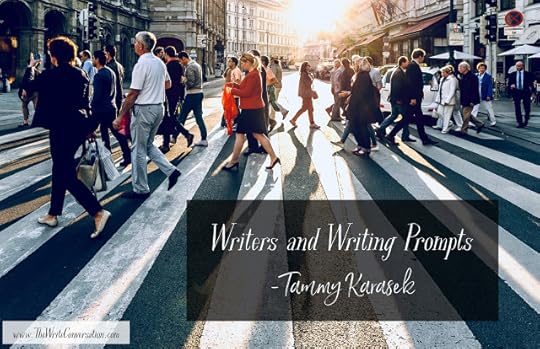
by Tammy Karasek @TickledPinkTammy
Writers often receive emails for writing prompts. They can come in handy and I’ve used them, too.
But they’ve not worked for me. I’m not sure how you’ve dealt with the effects of the shelter in place, but as an extrovert, it’s been different. I’ve been grateful that my FOMO (fear of missing out) has been kept at bay knowing nothing was happening—for anybody—so I wasn’t missing anything.Until the end of May arrived.
May brought with it loneliness and an achy feeling of sadness. Writer’s block was bigger than a block, it was more like a wall. Our favorite little spots to go and write were closed. My favorite spot was the mall to people watch, but also closed. I’d enjoyed that and would play the game of “what if?” as the people walked by. I’d make up stories about them. I missed that.
I decided I was going to figure out how to do it again. That day, I needed to get a few things at the grocery store and I made a plan.
I grabbed a mug of iced tea, a tablet and my pink fountain pen loaded with pink ink (of course). I went to the grocery store first, then moved my car under a tree and rolled down my windows. I’d positioned to see the store but also facing a coffee shop. From where I was perched, I could see the comings and goings of two plus businesses.
The time passed quickly. Before I knew it, I had five pages of ideas. And what started out as watching life and letting it be my writing prompt, turned out to a little bit of prayer time, too. On occasion, I felt led to pray for specific people.
As an extrovert, I got to see people. No, I didn’t scare them by yelling hello out the window—but don’t think the thought didn’t cross my mind several times. Just saying. And I wrote down many ideas for characters in my stories.
Here’s idea I spent a lot of time on. Maybe you’d like to give this a try. I made two columns. Women and Men
On one line I wrote: The man parked the car, got out, shut the door, walked to the front door, and went in.
I moved to the women column and did the same, always leaving a couple lines before the next sentence.
I did this several times.
When there was a break before new suspects, I mean people, I’d go back to a sentence and rewrite it with more details. The above one with the man became: The man dressed in jeans and a vivid red t-shirt slid halfway out of his car, then paused and leaned back in to retrieve his keys and a bag. From his left hand, he put his mask on his left ear and then reached around his face to do the same on his right side. All masked up, he walked to the door of the grocery store. As he walked, he seemed to step, then slightly drag his right foot. Had he been in an accident? An old sports injury? The intriguing part was the way he flipped his circular key ring around his pointing finger as he walked. Flip. Hold. Flip. Hold. Did something have his attention? Was it a nervous habit? Details that could enhance the character.
It became interesting to me watching and trying to describe the people all the little ways the people moved. Then taking it to the next level of what might be going on in their lives.
Then came my first nudge to pray for someone. A very small elderly woman came along and I found myself entranced in her every move. She was slow and rhythmic as she walked through the parking lot with her cane. Her head hung down slightly as she watched the parking lot and walked. When someone got within a few feet of her, she’d raise her head, smile and speak. I couldn’t hear the words, but every time—every time, the other person would walk as if they would pass her, but as she’d speak, they’d pause, smile and speak back. She’d wave to them, then look back down as she carefully walked on.
A tear let itself go. And I felt in my gut, pray for her. So I did. I prayed for God to watch her steps and keep her safe. I prayed for her sweet and gentle spirit to wash over all those people she would encounter in that store. And I prayed that I would remember her actions and do them, too.
After wiping the rest of the tears that had released after watching her, I stared at my page with blotches now smearing a few of the sentences. And I turned the page to write again.
I’ve always been a body language reader. But I realized I wasn’t using it in my writing very well. This lady’s actions reminded me to not leave out the tiny details of life. The rest of my time their, I’d watch for someone, make a story about not just their mannerisms, but also their facial expressions. Shoulders up or drooped down like in defeat. A grimace or a smile.
And I began filling life into my characters as I placed their stories down on paper.
Are you in a rut with your character development? I encourage you to find a place you can sit and people watch with a tablet. What catches your eye? Describe it in full detail on your paper. What motions or actions set them apart? I’ve noticed a difference in my descriptions of people in my scenes. Maybe it will help you, too.
Have you tried something like this?
TWEETABLEWriters and Writing Prompts - tips and tricks from @TickledPinkTam on @EdieMelson (Click to Tweet)
 You’ll find Tammy seeing humor and causing laughter in every aspect of life. Her past, filled with bullying and criticism from family, is the driving force of her passion to always encourage others and give them The Reason to smile. She’s been married to her college sweetheart, Larry, for 37 years, a mom to their grown daughter, Kristen, and wrapped around the paw of a little dog named Hattie. Born and raised in Ohio, her family now resides in South Carolina. She is the President of Word Weavers Upstate SC, member of ACFW and My Book Therapy/Novel Academy. She’s the Blog Editor for Word Weavers International. A Conference Assistant for Blue Ridge Christian Writers Conference. A monthly contributor for The Write Conversation. A contributor in the 2018 Divine Moments Compilation Book—Cool-inary Moments. Also a regular contributor to several other blogs.
You’ll find Tammy seeing humor and causing laughter in every aspect of life. Her past, filled with bullying and criticism from family, is the driving force of her passion to always encourage others and give them The Reason to smile. She’s been married to her college sweetheart, Larry, for 37 years, a mom to their grown daughter, Kristen, and wrapped around the paw of a little dog named Hattie. Born and raised in Ohio, her family now resides in South Carolina. She is the President of Word Weavers Upstate SC, member of ACFW and My Book Therapy/Novel Academy. She’s the Blog Editor for Word Weavers International. A Conference Assistant for Blue Ridge Christian Writers Conference. A monthly contributor for The Write Conversation. A contributor in the 2018 Divine Moments Compilation Book—Cool-inary Moments. Also a regular contributor to several other blogs. Connect with Tammy: Blog: http://www.tammykarasek.com Email: tickledpinktammy@gmail.com
Published on July 18, 2020 22:00
July 17, 2020
When Fear Paralyzes Your Writing
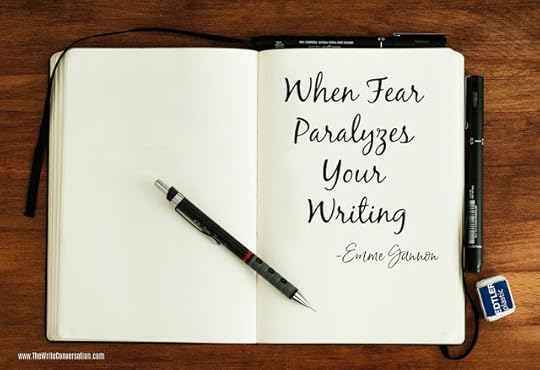
by Emme Gannon @GannonEmme
I thought I’d adapted to the idea of empty pews and store shelves and closed businesses, as well as loss of relationships with others and my church family. That all changed when a wasp took over my mailbox and stung me several times on my hand when I went to retrieve the mail. By evening my hand had doubled in size and my indomitable spirit had crashed. Fear took over.One wasp.
It just took a small insect to arouse all the fears that I’d kept hidden away during this pandemic. The wasp was like a pin that broke a balloon filled with muddy water, spewing dirty liquid everywhere.
Fear robs and destroys both body and soul and most often occurs when we feel we’ve lost control. In fact, physicians believe a person’s reaction to stress can release a hormone that temporarily reduces the heart’s ability to pump. They call it cardiomyopathy, or “Broken Heart Syndrome.” When our world crashes and nothing we do can make it better, we often hide from our feelings. Like a splinter, our emotions eventually make their way to the surface. The support system that we’d relied upon in the past is now self-isolating and we find ourselves alone. It’s when we’re standing before God with mucky water dripping all over our nice clothes that we admit we can’t make it without Him.
How easily we lose sight of the dark spirit of Satan who unmercifully persuades our hearts to move away from God’s love and protection into the murky water of fear. C.S. Lewis depicted the insidious plot of the enemy of our soul in his apologetic novel, The Screwtape Letters. Written in satirical style, the characters illustrate how Satan tries to pervert God’s truth. Lewis’s character Screwtape is a senior demon teaching his young and less experienced demon nephew how to draw his charge away from scripture toward belief in Satan’s lies. When commenting on the book, Lewis said that the goal of Satan is the “anguish and bewilderment of a human soul.”
In his book, Lewis depicted some of the ways Satan and his demons attempt to destroy God’s truth:
Satan always inflicts fear. Screwtape’s advice to his nephew: “Your patient will, of course, have picked up the notion that he must submit with patience the tribulation which has actually been dealt out to him—the present anxiety and suspense. . . It is your business to see that the patient never thinks of the present fear as his appointed cross but only of the things he is afraid of.”
Satan uses fear to draw humans away from God. Screwtape: “You can weaken his prayers by diverting his attention from the Enemy Himself (God) to his own state of mind about the Enemy (God.) On the other hand, fear becomes easier to master when the patient’s mind is diverted from the thing feared to the fear itself.”
Satan wants us to live by feelings instead of faith. Screwtape: “Whenever humans are attending to the Enemy Himself (God) we (demons) are defeated, but there are ways of preventing them from doing so. The simplest is to turn their gaze away from Him to themselves.”
I suspect we’ve on occasions succumbed to the weakness and weariness of the human soul and allowed our feelings to dictate truth. Only by acknowledging that God is in control of all things, can we strip the label “victim” from among us. We embrace the truth that God is not only in control of the lives of His children but the entire universe, which is His. Fear has little chance to invade our soul when we know that whatever happens, God is in control.
During times of stress, my husband would hold me in his arms and say, “Everything is going to be all right.” And it was. That’s just what God says to His children. He wraps us in His love and says, Don’t worry. I’ve got this. Everything is going to be okay. And it will. No matter what.
Whatever situation is piled on top of the trauma our nation and world is experiencing, be it sickness, job loss, financial, or even something small like an insect bite, the Lord is in control. And everything is going to be okay.
We are eternal beings and our time on earth is determined by God. We must be careful to not be so intent on saving our lives that we neglect to live our lives. Political change and viruses cannot separate us from the love of God. Comforted by His truth, we use our gifts to His glory and know that He’ll be with us as we encounter crises in our lives. Even if that crises is as small as a wasp.
TWEETABLEWhen Fear Paralyzes Your Writing - encouragement from @GannonEmme on @EdieMelson (Click to Tweet)
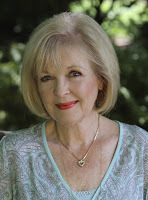 Emme Gannon is a wife, mother, and grandmother who loves to write stories that stir the heart. Her award-winning writing has appeared in Focus on the Family magazine, several anthologies, and numerous newsletters. She just completed her first novel.
Emme Gannon is a wife, mother, and grandmother who loves to write stories that stir the heart. Her award-winning writing has appeared in Focus on the Family magazine, several anthologies, and numerous newsletters. She just completed her first novel.
Published on July 17, 2020 22:00
July 16, 2020
Saving the Mount Hermon Christian Writers Conference
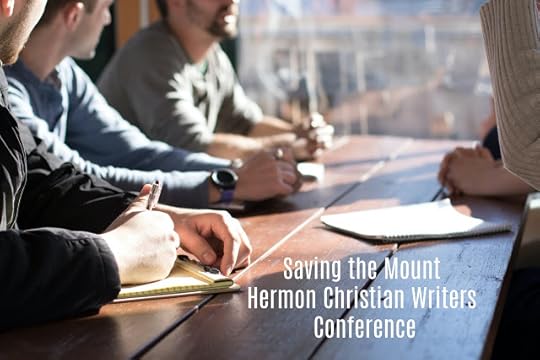
by Edie Melson @EdieMelson
The Christian publishing industry received sad news several weeks ago—The Mount Hermon Christian Writers Conference was closing. For those of us who've been part of the industry for years, this was the granddaddy of all events. And it's been on my bucket list for years. Then a possible reprieve—Steve Laube announced his attempt to keep this wonderful event alive through a Kickstarter campaign. I pray he's successful.
All the details are here, on his post, Help Save the 2021 Mount Hermon Christian Writers Conference. My first thought was that 2021 would be my year and I'd find a way to attend. Then I saw the cost and realized that wasn't something I could manage.
BUT, every little bit helps, and I'm definitely donating to help keep this conference running!
Here's another post with Everything You Need to Know About the 2021 Mount Hermon Christian Writers Conference . I hope you'll join me as we all band together to keep our industry events strong!
TWEETABLESaving the Mount Hermon Christian Writers Conference - @SteveLaubeAgent (Click to Tweet)
Published on July 16, 2020 13:43



